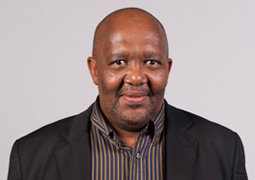
During a Women in Leadership Dialogue Session currently being hosted by the Eastern Cape provincial branch of the Commonwealth Women Parliamentarians at the Maluti Civic Centre in Matatiele in the Alfred Nzo District Municipality, the Deputy Speaker of the National Assembly, Mr Lechesa Tsenoli, told delegates about the role of the late Mr Alfred Nzo in the struggle against all forms of oppression. He also spoke about the fourth industrial revolution and gender mainstreaming in South Africa.
Describing the late struggle veteran, Mr Tsenoli said that together with other struggle veterans, Mr Nzo, the district’s namesake, exposed apartheid to the world. “Alfred Nzo worked tirelessly with Jonny Makhathini to expose the South African problem to the world. Together, they waged a campaign that led to the declaration of apartheid as a crime against humanity. When we deliberate here at Alfred Nzo District, we must be mindful of that,” Mr Tsenoli reminded delegates.
Mr Tsenoli emphasised districts’ and municipalities’ critical role in advancing service delivery and the attendant need for good governance in how they manage this responsibility. Good governance does not end with the management of money, keeping of books and reporting, Mr Tsenoli said. He referred to the United Nations’ Declaration of Good Governance to illustrate his point. “Good governance also has a human development perspective. It seeks to ensure that people have a say and hold decision-makers to account. It is inclusive, women are equal in private and public spheres of life. Also, [it must] ensure that the needs of future generations and the socio-economic choices that people have are reflected in politics.”
Speaking of the fourth industrial revolution, he said this was a process of capitalism reinventing itself and is an amalgamation of the first, second and third industrial revolutions. This time, however, the revolution is based on artificial intelligence and enabling machines to automate certain mundane services.
Such inventions have both positive and negative impacts on people’s lives and will impact on all spheres of life, even education. “Research also shows that the kind of jobs and careers that kids are studying towards won’t exist in future. This will have a profound impact on their future. That is how disruptive the fourth industrial revolution is and will be on the future of our society.”
One of the benefits of this is that it will liberate people from hard labour. “The hard and often dangerous labour often associated with deep mining will now be automated. This will help in saving the lives of miners who were charged with this task. But the flipside of that is that the creation of jobs in mining will reduce over time and this will have a negative impact on the revenue and livelihood of mining towns,” Mr Tsenoli said.
The health sector will be another major beneficiary of this revolution. “Through artificial intelligence, there will now be machines that can detect disease in children before they are born. They will also administer medication to avert any mental or physiological anomalies.”
The revolution will also increase the danger of identity theft and fraud, and there is a need for a national strategy to make sure South Africa optimises its impacts. “This strategy should spell out how government will harness these technologies, how ready it is to deal with its risks and how it will ensure that this revolution is not captured by those who are rich as a means to their ends. This will ensure that all people benefit from its positive results and its negative impact is mitigated.”
“The reality is that we have no choice; we cannot choose not to embrace this revolution. It’s an inevitable development of our life and times.”
Turning his attention to gender inequalities in leadership, Mr Tsenoli said there is now a positive realisation that hiring women in leadership positions is essential. “This is due to the political pressure brought to bear by legislation and policies, which regard gender mainstreaming as a basic human right.”
Mr Tsenoli said the barriers to gender mainstreaming are often attributed to unconscious bias. “Often, those in charged with recruitment in big companies claim that they were not aware that they were discriminating women in their recruitments … This is what is called unconscious bias.”
The public sector, in contrast to the private sector, has done much to overcome barriers to gender mainstreaming. “The public sector has made considerable effort to address gender disparities. It has adopted many strategies to address this matter. Yes, there is much that still needs to be done, but progress has been made in this regard,” Mr Tsenoli concluded.
Abel Mputing
20 June 2018

